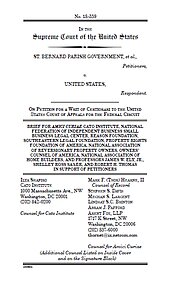Learn more about Cato’s Amicus Briefs Program.
The Fifth Amendment’s Takings Clause provides that the government may not take private property without giving just compensation to property owners. It was woven into the thread of our founding document to ensure that the government will always be held accountable for its actions—or omissions—which result in landowners losing their property. Today, however, the government constantly attempts to circumvent its duty to compensate landowners, and too often courts let lend it a helping hand.
In the 1950s, the U.S. Army Corps of Engineers began constructing the Mississippi River Gulf Outlet (MRGO) navigational canal in Louisiana, turning a 650-foot channel into a half-mile wide waterway. To construct the canal, the Corps destroyed wetlands that were protecting the St. Bernard Polder, an expansive stretch of low-lying land, from hurricane flooding and resulting property damage. They failed to armor the banks of the canal from erosion or take any action to guard against the known risk of catastrophic damage to St. Bernard Parish (“parish” is the Louisiana name for a county).
When Hurricane Katrina struck Louisiana in 2005, a 25-foot storm surge went directly up the MRGO, destroying the levees and devastating St. Bernard Parish. Parish residents suffered unimaginable property loss, as their homes were utterly decimated by the storm. When the people of St. Bernard tried to hold the federal government responsible for its inaction, the U.S. Court of Appeals for the Federal Circuit denied their claim.
Still, the Supreme Court has established that if the government floods private property, it is a taking for which the Fifth Amendment requires just compensation. Cases such as Arkansas Game & Fish Commission v. United States (2012) consistently stand for this important principle. Numerous state courts agree on this issue and hold that when government inaction causes flooding and property loss, it constitutes a compensable taking.
The Federal Circuit, on the other hand, has tried to create a distinction between government action and inaction. The court’s opinion in this case is an attempt to rewrite takings jurisprudence, providing the government with a convenient escape route by which it can avoid the constitutional responsibility to compensate landowners for taking their property by not taking reasonable steps to prevent damage.
This loophole cannot be allowed to fester, so St. Bernard Parish has asked the Supreme Court to settle this issue definitively. Cato and ensemble cast of organizations and professors have filed an amicus brief supporting that petition. We argue that when the government, whether through action or inaction, takes private property, it has a distinct, well-established responsibility to compensate landowners.
